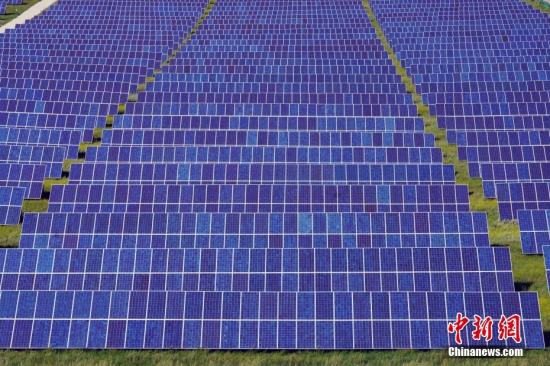Source:Ecns.cn 2024-05-22

A national demonstration project of wind and solar energy storage and transmission in China. (Photo: Ren Haixia/ China News Service)
By Lin Zhuowei
(ECNS)—U.S. President Joe Biden announced Tuesday a significant rise in tariffs on Chinese exports, including electric vehicles (EVs), lithium batteries, and solar panels, with the tariff rate on EVs increasing from 25 percent to 100 percent.
The new tariff policy came as the 2024 U.S. presidential election, where President Biden is running for re-election, has entered a key stage. What message does the timing convey? And how would it impact Sino-U.S. trade, industrial restructuring and upgrading, as well as global sustainable development?
The tariff hikes are designed to contain competitive new energy industries in China and to balance the U.S. trade deficit through protective measures, said Linjie Chou Zanadu, a senior research fellow at the European Center for Peace and Development, in an exclusive interview with China News Network.
Trapped in realist thinking, the U.S. upholds protectionism
"The policy is made to contain the industrial competition from China, which aims to give the U.S. more advantages. The U.S. is trying to protect its domestic EV market," analyzed Chou.
"This is especially true for the Democrats," noted the expert, "Liberal politicians in the U.S. like to portray themselves as leaders in innovation and social engineering in a post-materialistic world…The dysfunctional bipartisanship is a clear example of the internal political confusion within the country."
What's worth noticing is the paradoxical practices of the U.S. It is heaping heavy tariffs and "overcapacity" nonsense on China while advocating bilateral climate cooperation with China, said Chinese officials in response.
"Dialogues and cooperation are the megatrends of the world. But more importantly, as I have said before, competition and hegemonic position are more important for the U.S. than the advocation of bilateral climate cooperation," explained the IR researcher, "We must understand the U.S. is purely operating on a realist political agenda."
A binary perspective, economic policies with imperialistic and colonial origins
To better understand the motives and intentions behind the new tariff policy, Chou advised a close examination of the historical legacy as he believes that Western protectionism "originated from imperial Britain and influenced American economic traditions."
"This policy is characterized by a binary perspective, where things are seen as either black or white," added Chou.
Therefore, the United States strives to maintain its economic hegemony through fierce competition, which is considered essential for survival in the international system, Chou concluded.
Copyright © Xizang Daily & China Xizang News All rights reserved
Reproduction in whole or in part without permissions prohibited
Index Code: 藏 ICP 备 05000021 号
Producer: Xizang Daily International Communication Center